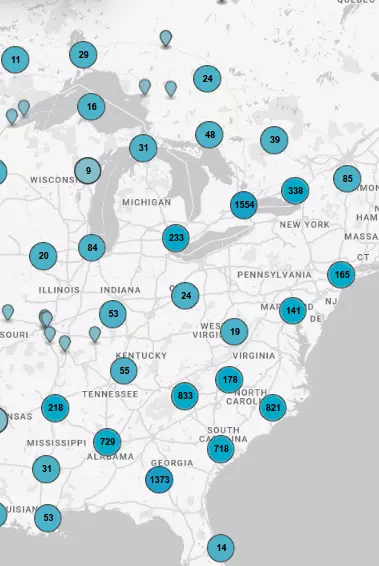Pine Mountain Valley Resettlement Project
The Resettlement Administration was founded on May 1, 1935 as part of the second phase of President Roosevelt´s New Deal. FDR took a personal interest in the planning of this project with...
- lat34
Kingsboro & Cataula
At KINGSBORO. 3mi. S., Ga.´s first narrow gauge railroad (North & South RR), chartered in 1870 (Columbus to Romel), ended in 1873. CATAULA (Big Rock) is a Creek name. Clowers Meth....
- lat34
Whitesville
Incorporated in 1837 and named for the pioneer ´White´ family. Whitesville was the site of a stagecoach stop, inn, and stores on a branch of the Oakfuskee Indian Trail. This early road continued...
- lat34
Bartlett's Ferry Dam: Antioch Baptist Church
BARLETT´S FERRY DAM: ANTIOCH BAPTIST CHURCH --- 1 ½ Miles --> Rev. Simpson Wilson Barley (1827-1884), minister and doctor, operated a ferry, known as Bartley´s Ferry, 1 ½ miles west on the...
- lat34
Harris County
This county, created by Acts of the Legislature Dec. 14 & 24, 1827, is named for Charles Harris, eminent Savannah jurist. Born in England and educated in France, he served Savannah as Alderman or...
- lat34
Blue Star Memorial Highway
A tribute to the Armed Forces That have defended the United States of America SPONSORED BY The Dogwood District In cooperation with The Dogwood West Taskforce The Garden Club of Georgia, Inc, And...
- lat34
Seven Chestnuts
On this site under seven chestnut trees the Creek Indians held their council meetings. A.J. McBridge Chapter, U.D.C., - 1970 70 Plaque courtesy Lat34North.com. Original page, with additional info,...
- lat34
Sandtown Trail
This road was originally the Sandtown Trail traveled by several tribes of Creek Indians. It connected Sandtown on the chattahoochee river near Atlanta, Ga. with another Sandtown in Tallapoosa Co.,...
- lat34
Hungarian Colony
In 1888, three wine-making communities were founded here on some 2000 acres. A local land developer, Ralph L. Spencer, invited some 200 Hungarian wine-making families to settle this region. They...
- lat34
Historic Tallapoosa
Tallapoosa was a place of great ceremonial importance to the Indians. Here in 1826 settlers discovered ´Charles Town,´ an Indian Village named for one of their great warriors. Several...
- lat34
Haralson County
This County, created by Act of the Legislature Jan. 26, 1856, is named for Gen. Hugh A. Haralson, Member of Congress and Chairman of the Committee on Military Affairs during the Mexican War....
- lat34
Sparta Cemetery
The main cemetery in Sparta was established on property deeded to the town in 1806. Burials illustrate a common nineteenth-century pattern of migration to the area, as settlers from New England...
- lat34
Camilla and Zack Hubert Homesite
Zack Hubert, a former Warren County slave, moved here with his family in 1871. The Huberts were among the first African-American landowners in central Georgia and played influential roles in the...
- lat34
"July" 1858 The Original July Foxhound
In July 1858 an Irish Foxhound arrived in Georgia as a gift from the noted hunter, Nimrod Gosnell of Roxbury Mills, Maryland, to Colonel Miles G. Harris of Hancock County. the male puppy was...
- lat34
Gov. William Rabun
The home of William Rabun, Governor of Georgia 1817-1819. Governor Raburn moved to Wilkes Co., Ga., in 1785. Having the unusual backwoods schooling of his day, he acquired by reading...
- lat34
Gov. Charles James McDonald
4.2 mi. In this area stood the home of Charles James McDonald, elected Governor of Georgia in 1839 and 1841. "Fearless and guided by practical wisdom and integrity," he was Solicitor-general...
- lat34
Gov. William Jonathan Northen
William Jonathan Northen, Governor of Georgia from 1890 to 1894, lived in this house. Born in Jones County, July 9, 1835 of Scotch ancestry, Governor Northen graduated from Mercer University....
- lat34
Shoulder-bone Creek Treaty
Near the mouth of Shoulder-bone Creek on the banks of the Oconee River a treaty of "amity, peace and commerce" was signed by eight commissioners representing the State of Georgia and 59 head...
- lat34
Sparta
Sparta, Seat of Justice for Hancock County in 1795, became a chartered town, Dec. 3, 1803. Situated at an Indian trading post, in constant danger of border trouble, the town was named Sparta to...
- lat34
Hancock County
Hancock County, created by Act of Dec. 17, 1793, was named for John Hancock of Mass., President of Continental Congress and the first man to sign the Declaration of Independence. It has been the...
- lat34
